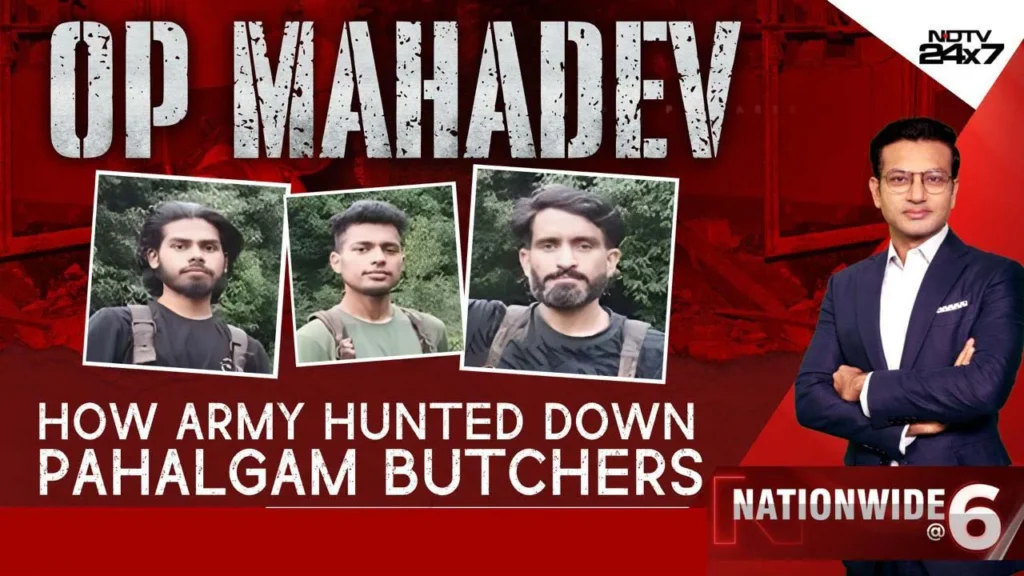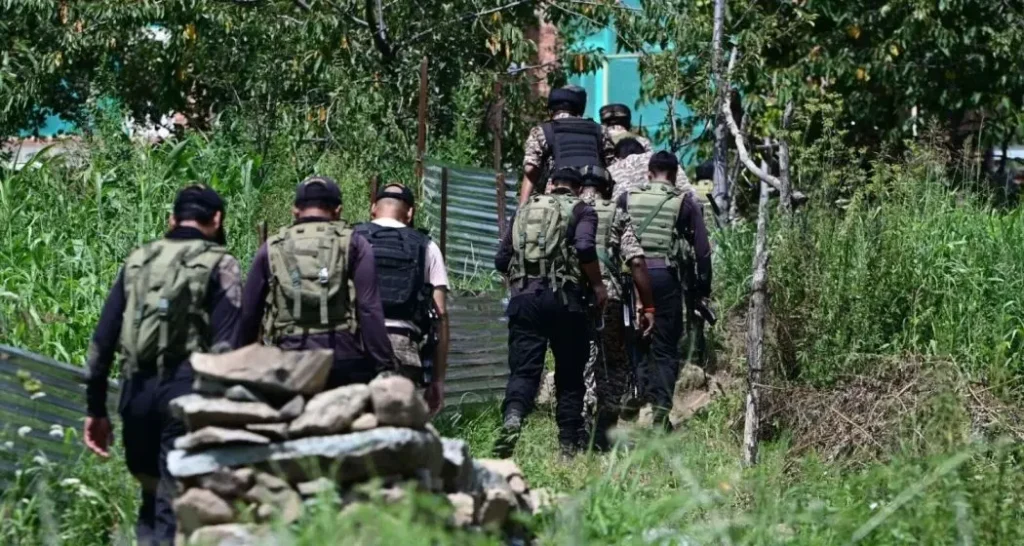Operation Mahadev for 22nd April 2025
- On 22 April 2025, five terrorists affiliated with Lashkar‑e‑Taiba (via its front group, The Resistance Front) carried out a mass shooting on tourists in Baisaran Valley (Pahalgam). Twenty‑six civilians were killed and around 20 injured—one of the deadliest attacks on civilians in India since 2008
- Lashkar claimed responsibility; one terrorist, Hashim Musa (also known as Sulaiman Shah or Musa Fauji), a former Pakistan Army commando and top LeT commander, was identified as the mastermind behind the attack and had a reward of ₹20 lakh on his head

Intelligence & Planning
- In mid‑July 2025, Indian intelligence agencies detected suspicious satellite/satellite‑style communication devices (e.g. ultra‑encrypted “T82 ultraset”) active in the Dachigam forests near Srinagar, traced to individuals suspected in the Pahalgam massacre
- This detection triggered a coordinated 14‑day surveillance and intelligence operation combining Indian Army’s Chinar Corps, CRPF, and Jammu & Kashmir Police
- Local shepherds/nomads in the area of Dachigam provided critical human intelligence that helped narrow down the terrorists’ probable hideout location
Launch & Execution of Operation Mahadev for 22nd april 2025
- Operation Mahadev for 22nd april 2025 was formally launched on Monday, 28 July 2025 in the Harwan / Lidwas region near Dachigam National Park, on the outskirts of Srinagar, acting on concrete intelligence inputs
- Units involved included the 24 Rashtriya Rifles, 4 PARA (Special Forces), CRPF, and J&K Police, operating under the command of Chinar Corps
- The code name “Mahadev” is believed to reference the terrain between the Zabarwan and Mahadev ridges where the encounter occurred, and symbolically ties to the spiritual resonance of “third eye” imagery associated with Lord Shiva on the third Monday of Sawan
The Encounter
- On the morning of July 28, forces swooped in on the terrorists who were resting in a makeshift trench under dense forest cover. They launched a sudden assault around 11:30 a.m. and neutralized all three militants in less than an hour
- The terrorists were allegedly “caught napping”—a common tactic: militants resting in between movements to evade detection
- Drone footage later confirmed the presence of all three bodies within the target zone by ~12:37 p.m.
Who Was Killed?
- The three slain terrorists have been identified as:
- Hashim Musa (Sulaiman Shah / Musa Fauji) — the alleged planner and executor of the April Pahalgam massacre, and a former Pakistan Army SSG commando
- Yasir — believed to be directly involved in the attack
- Abu Hamza (also reported as “Ali” in some sources) — alleged associate in the terror module
Two of the killed (Suleiman and Yasir) are confirmed to have had direct roles in the April attack; the third is likely part of the same infiltration cell.
Weapons & Equipment Recovered for Operation Mahadev for 22nd april 2025
- At the site, security forces recovered:
- 17 rifle grenades
- One M4 carbine (US‑made)
- Two AK‑47 assault rifles
- Encrypted satellite phone(s), indicating high‑level command and infiltration planning

Tactical Highlights & Challenges
- According to Lt Gen (Retd) K. J. S. Dhillon, the Dachigam forest terrain posed severe visibility constraints (often down to 2 meters)—making detection extremely difficult and requiring precise military intelligence and coordination
- The terrorists appeared fatigued and had lost physical weight during the 14‑day surveillance period—indicating they were cut off from supply lines and likely unable to maintain well‑prepared defensive positions

Outcome & Significance
- Operation Mahadev for 22nd april 2025 marked a decisive blow against a terror cell directly responsible for a high‑casualty, high‑profile attack. The elimination of Hashim Musa signified not only tactical success but also strategic prevention of immediate follow‑on terrorism operations
- In response to Operation Mahadev for 22nd april 2025 Jammu & Kashmir’s Chief Minister Omar Abdullah described it as “good news”, stating that such actions strengthen India’s position and undermine those supporting talks with Pakistan in the aftermath of terror attacks like Pahalgam
- Operation Mahadev for 22nd april 2025 followed Operation Sindoor (May 2025), another Indian counter‑terrorism mission in response to the same Pahalgam attack, in which multiple terror camps were destroyed across Pakistan‑occupied Kashmir, neutralizing over 100 terrorists
Aftermath and Political Reactions
The swift and successful completion of Operation Mahadev was met with widespread acclaim. Jammu & Kashmir Chief Minister Omar Abdullah called it “a piece of good news” and criticized those who advocate for dialogue with Pakistan in the face of continuous terrorist provocations.
The operation also had significant strategic consequences. It effectively dismantled a core Lashkar module operating inside Indian territory and neutralized leadership that could have planned further attacks during the high-traffic tourist season in Kashmir.
Operation Mahadev in the Context of India’s Counter-Terrorism Strategy
Operation Mahadev for 22nd april 2025 wasn’t an isolated strike but part of a broader strategy to eliminate foreign terrorist modules operating in Jammu & Kashmir. It followed Operation Sindoor, which reportedly targeted multiple launch pads across Pakistan-occupied Kashmir (PoK) in May 2025, destroying camps and neutralizing dozens of militants.
Together, these operations represent a shift toward pre-emptive and retaliatory doctrines, emphasizing quick action based on real-time intelligence.
Conclusion
Operation Mahadev for 22nd april 2025 marks a landmark success in India’s ongoing battle against terrorism in the Kashmir Valley. By eliminating the perpetrators of the Pahalgam attack, Indian forces sent a strong message to terrorist groups and their handlers: that no act of terror will go unanswered.
The operation’s success was a testament to inter-agency coordination, tactical excellence, and the courage of security personnel. As terrorism continues to evolve in its methods and networks, such operations underline the need for intelligence-led, swift, and decisive action to ensure national security.